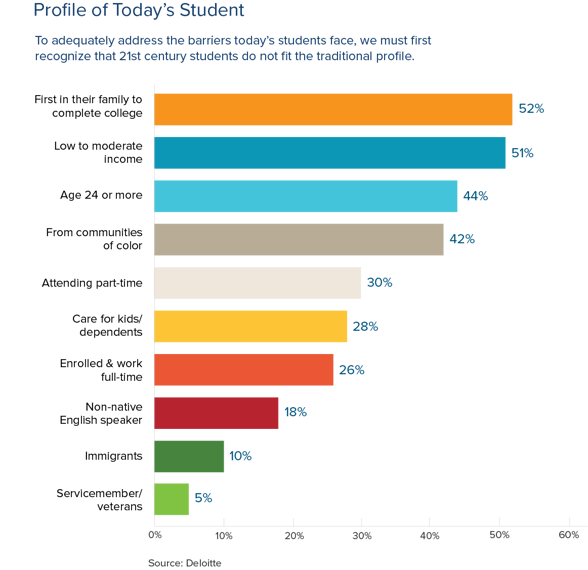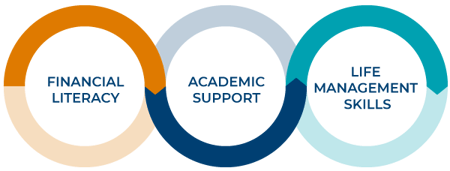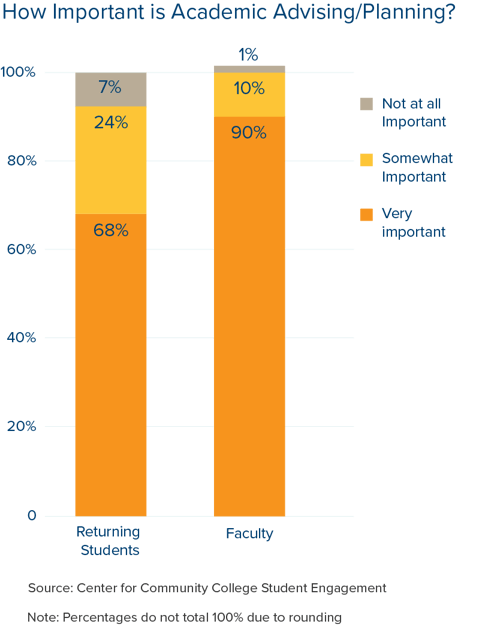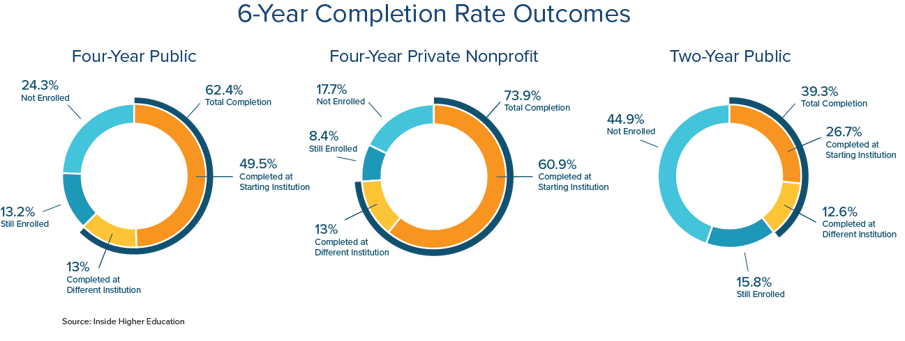Persistence & Completion Strategies Beyond Financial Literacy
Anyone who keeps pace with higher education knows there's a chronic need to improve student access, student success, persistence, and completion. But what does that really mean and why is there an issue to begin with?
In higher education, student success refers to success in persisting all the way through completion of a degree or certificate, in the pursuit of accomplishing dreams. And since many students rely on student loans to finance their education, it can also include successfully paying back those loans.
So why do some students drop out, stop out, or take a long time graduate? Why do they struggle in repayment? These are complex questions, for sure. Let's explore these challenges and share some suggested solutions on how to help students overcome them.
The changing student profile
 If you look at the profile of today’s college students, they juggle a lot of responsibilities. Some are overcoming barriers as a first-generation college student. Others need to work full-time to support themselves and perhaps care for children or other dependents. `
If you look at the profile of today’s college students, they juggle a lot of responsibilities. Some are overcoming barriers as a first-generation college student. Others need to work full-time to support themselves and perhaps care for children or other dependents. `
The 21st century nontraditional student can face an uphill battle when stepping foot on campus. For example, a first gen student may not understand:
- How to apply for financial aid
- Student loan type differences
- How to create a realistic and achievable class schedule
- Hidden curriculum challenges to overcome
Whereas students who have to work during college, may experience different challenges.
- Being unavailable during regular office hours to obtain guidance or support, due to managing competing demands for time.
- Needing extra time to complete their degree program due to competing responsibilities
3 strategies to improve persistence & completion
So how do you help your students feel like they're part of your college family, pass their courses, return each term, graduate timely, and prepare for a career or advanced studies?

 Offer a solid finlit program and set an expectation of use
Offer a solid finlit program and set an expectation of use
Financial literacy, or financial wellness, is understanding how to manage personal finances and money. Knowing how it works and how to budget, invest, borrow can help students make better financial decisions. Most schools offer some kind of financial literacy. Topics are varied and numerous and might include:
- Ways to fund your education
- Preventing student loan default
- Avoiding student loan scams
- Ways to help you manage your student loans
- Budgeting
- Credit basics
- And a lot more
One way for schools to determine how to set up a financial wellness program is to follow the Top 6 Recommendations From Treasury For Improving Student Financial Success.

A campus-based program can be varied in scope. But the overarching goal remains to help students understand how to make smart financial decisions related to their education and not end up crippled by student loan debt. In addition to the program itself, make an effort to physically place valuable student loan repayment information into the hands of students. Doing so will ensure they’re prepared for life after college, which is the whole point.
It's no longer enough to simply provide the financial literacy learning opportunity for students. It's necessary to set an expectation for your students to complete an assigned curricula and nudge them toward improved financial wellness. Finding a program or partner that makes it easy to monitor users and their activity on multiple fronts can be key to success. By doing so, you'll also gain insight into student engagement activities to make continual improvements in your program and outreach.
 Provide academic support to help build a strong foundation
Provide academic support to help build a strong foundation
Understanding that some students need academic support in order to succeed, is a good step in moving beyond financial literacy. Academic support refers to a variety of services, resources, or counseling to aid in the student learning progress or to meet certain standards. Types of academic support can include learning labs, support centers, and personal coaching. Topics run the gamut and may include:
- How to reduce test anxiety
- Developing critical thinking
- How to succeed in math
- And everything in between

There's a wide variance in the amount of academic support individual students need while on campus. Some have never received prior support. While others may be prepared to mentor their peers. Regardless where students fall on the spectrum, there's no denying that academic support plays a critical role in the college student experience and lends to success.
According to the Center for Community College Student Engagement:♦ 92% of returning students said academic advising was very/somewhat important to their academic success
While schools do their best to help their students, the average ratio of student advisees to advisor has shrunk to 375 to 1. And according to the Hechinger Report, "Though more students than ever [have to] work to pay tuition and expenses, advisors are seldom available at night or on weekends. And waits for appointments during business hours can stretch for weeks." This lack of available advising can manifest as students floundering, changing majors, not understanding education funding sources, and taking longer than expected to graduate.
So what's a school to do?
The University of Pittsburgh's Office of First Year Experience helps newly transitioning students find a welcoming and engaging campus community by connecting them with peers to forge new friendships. The program requires students to use a financial literacy tool, offers mentoring and academic assistance, and helps overcome the hidden curriculum of unfamiliar norms and values.
Not all schools are in a position to have an office solely dedicated to helping new students find their way. That's when finding a trusted and cost-effective service to supplement your advisors can be a great solution. Be sure to find one that provides the three key elements: financial literacy, academic support, and life management skills.
 Offer opportunities to learn valuable life management skills
Offer opportunities to learn valuable life management skills
Students learning how to manage a new routine and surroundings can be stressful and overwhelming. Especially for those that may not have had the opportunity to learn life skills that could otherwise empower them in everyday college life.
It's imperative to help students not only feel a sense of belonging on campus but to provide opportunities to learn how to overcome challenges that may arise. Topics of learning include:
- Maximizing your college experience
- Mastering time management
- Handling failure in and out of the classroom
- Improving student-faculty relationships
- Understanding the hidden curriculum
 ♦ ≈ 1/3 college students are first generation, many of them students of color
♦ ≈ 1/3 college students are first generation, many of them students of color
They may be unaware of the basics in how to find housing, learn the campus norms, and understand the unspoken expectations that can create an entirely new experience for many students.
Helping students build a strong foundation of knowledge helps solidify you’ve given them the absolute best chance to persist and graduate and live their best life. Successful life management skills can equate to good decision-making in one's physical and mental health, nutrition, stress management, making friends, self-care, and understanding unfamiliar norms and values that steer interactions between students, faculty, and their surroundings.
